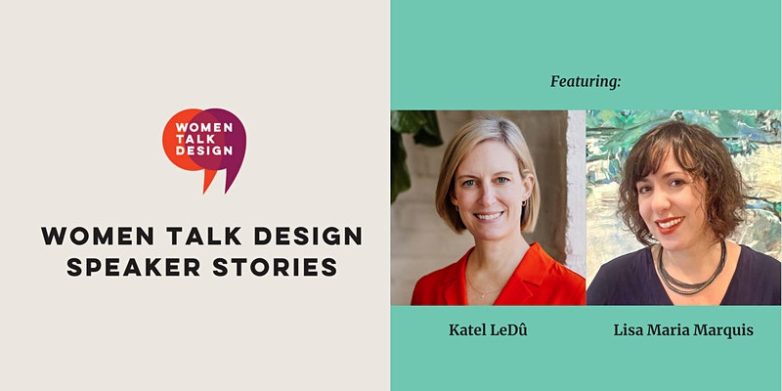Katel LeDû and Lisa Maria Marquis on how their speaking and writing fuel each other
As part of our #WTDSpeakerStories, we spoke with Katel LeDû and Lisa Maria Marquis about their journeys as speakers, writers, and co-authors of the book You Should Write a Book. They both opened up about why they choose to share their voices across mediums, how their speaking and writing fuel each other, and the topics they are passionate about.
In our Women Talk Design Speaker Stories series, we’re interviewing Women Talk Design speakers about their journeys and experiences. We talk to speakers who are just getting started, speakers who have had their fair share of speaking mishaps, speakers writing books, and speakers curating events. At the end, we offer an opportunity for folks from the WTD community to ask their own questions and connect with each other. Visit our events page for more information about the series and RSVP for our next event.

Katel LeDû is the CEO of A Book Apart, where she helps passionate tech community members become successful authors. She’s also the founder of Liminal Bloom, a coaching practice where she helps people bring creative purpose to life. Previously, she worked with National Geographic as their digital director of photography, and has been in publishing since the early aughts. In all practices, Katel supports folks to cultivate creativity, develop social awareness in themselves and in their work, and embody sensitivity and empathy as superpowers. She loves taking time to run long distances, reading, knitting, and learning the secrets of life from her snaggle-toothed mutt, Hugo.
Lisa Maria Marquis is an independent consultant, speaker, author, and editor. As a content-driven information architect, she helps organizations to build findable, understandable, and usable digital experiences. As the managing editor of A Book Apart, she helps authors to produce instructive, inclusive, and empowering books about technology. She is the author of Everyday Information Architecture and coauthor of You Should Write a Book. Lisa Maria enjoys poetry, knitting, and Star Trek. She lives near Boston with her partner and several dogs.
On starting to share their voices
Katel started off by discussing her beginnings in writing, describing public speaking as a more up-hill path for her.
Katel: “I definitely started in the writing camp of things. Just being very upfront and transparent – public speaking has always been and still is a much steeper hill for me to climb. I’ve had a fear of public speaking for a lot of my career. Being in typically male-dominated career fields has not helped that. I spent a lot of my early career looking for ways to share my voice and writing felt most comfortable to me.”
“Now that isn’t to say that I don’t like talking about the work that I do – as you can see, I’m here today. But that felt really important for me to learn along the way – that certain ways of expressing my ideas and certain ways of talking about the work that I do felt more comfortable and more within reach for me and that it was okay to focus on those.”
Lisa Maria also talked about her beginning as both a speaker and a writer, though she mentioned using the mediums for different purposes.
Lisa Maria: “I’m very different. I would say which came first – writing or speaking – is a ‘chicken or the egg’ question. In a general sense, as long as I can remember, I’ve been interested in writing and I’ve been interested in being on stage. Those things have always been very intertwined for me.”
“From a career perspective, speaking came first. I’ve always been writing, whether it was poetry or blog posts or fiction or essays or whatever it was. But in terms of my career, I was making speaker decks long before I wrote a book. They certainly feed on each other, they benefit from each other. But one of those things definitely came first.”
“I’ve always been comfortable with public speaking. When I was little, I wanted to be an actress. It turns out I’m terrible at it, but I was always very comfortable showing off and being the center of attention. So yeah, why not get up on stage and tell people about my work? That seemed fun.”
Katel: “But it’s not for everyone. And can I just say that it is very reassuring to work with someone and be friends with someone and be colleagues with someone who does feel that way. Because it sort of rubs off on me. I’m like, ‘Okay, maybe I can do this and I can feel confident about it.” So surround yourself with the people who do things confidently that you want to do – it might rub off.”
Even though they describe their beginnings differently, both Katel and Lisa Maria talked about why they are so drawn to writing in particular.
Katel: “My college degree is in photography, which my mom was not super thrilled with at the time. But I minored in English because I loved writing. For whatever reason, that felt most accessible to me. I think my entry in English felt like [having] a skill that I could use no matter what.
“Then, when I got into the professional world, I realized I could work for publishers where writing comes into play and [other] artistic skills come into play – like photography and photo editing. That’s sort of where my journey at National Geographic unfolded.”
“I love spending time in the process and writing is one of those arts that really allows you to marinate in it. If you have done any writing, you know it usually takes a long time to craft something into its final form. I just really love that aspect of it. That’s definitely a theme unfolding for me over the last couple of years: The desire to slow down and take my time doing things that I feel are worth spending time on.”
Lisa Maria: “Writing is something that was always with me. I, too, have a minor in English in my undergrad. Then, I actually studied design in college and sort of hated it so I took a lot of refuge in my writing classes and ended up going to graduate school for writing. It ended up being a very sincere love of mine.”
“I found it very helpful early in my content and design career to write about what I was learning and what I was trying to teach myself. Like most people, I got into web work through a strange series of turns and twists. And so there was a time in 2010, 2011, and 2012 where I was trying to figure out ‘What is content strategy? What does that mean for me? And how can I start doing this more?’ A big part of my learning was blogging back what I was seeing and reflecting on how I was implementing these new techniques in my work.”
“I was treating a blogging space at the time as a sort of work study and that is just a hop, skip, and a jump away from putting together a slide deck. So the writing and the speaking really grouped together and they fuel each other.”
On what topics they’re passionate about right now
Katel and Lisa Maria also gave us a preview of the topics they are diving into now, discussing how their current topics are fueled by their past experiences.
Katel: “One thing that’s top of mind for me right now is something that came out of the book that we wrote, You Should Write a Book. In pushing it out into the world, we got comments that were like, ‘Oh, this is so encouraging. I have ideas and I think I want to write a book, but what about imposter syndrome?’ Hearing that more than once really landed in me for a lot of reasons, one of those being wanting to dissect what imposter syndrome is and the fact that so many of us feel it as though it’s a thing prescribed to us, especially as women.”
“It’s imposed on folks with marginalized identities as a lack of confidence and I really want to look at that a lot more closely in terms of lack of confidence versus visibility – not being invited to the table or literally being shut out from conversations – what that actually means in terms of imposter syndrome. It’s very different to feel like you’re showing up to something and you have no idea what you’re doing versus not feeling like you have the space to share what you know.”
Lisa Maria: “From a design career perspective, the thing I’m very interested in speaking about right now is information architecture. I’m interested in information spaces and how we experience information on the web. What that really means is, how do people interact with things? How do they make decisions? How do the people who are doing the design interact with things and make decisions? Which is a very long way of saying that I’m interested in systems thinking. How do I help other people to be able to see the systems in which we’re operating, whether that means the systems in which we are accessing the web or the systems in which we are designing the web.”
“I’ve been speaking for almost 10 years and I’m saying the same thing at conferences over and over. Why are websites still bad? What’s really getting in the way of doing good work? And I think so much of that comes down to seeing the system that we’re operating in and changing it to do right by our users.”
On how they find speaking opportunities
Lisa Maria and Katel talked about starting small and local when beginning as a speaker and how to grow from there – or stay where it feels most impactful and comfortable.
Lisa Maria: “When I first started out, it was a lot of, ‘Where will they let me in?’ For me, that meant starting local, starting small. There were local meetups and places where people are also learning about content strategy and also learning about UX in the community who might want to hear what I have to say or talk with me about my ideas so that I can figure out what it is I want to say. It was looking for those opportunities that had a low barrier to entry in a community that I was already familiar with.”
“From there, once you get a couple under your belt and you get more confidence, you could start reaching out and looking for things on a different scale. I was able to get my foot in the door at a couple places that spoke well for me to then go on to other places. Each opportunity builds the next. At the same time, look for networking connections. I would get invited to small association gatherings that weren’t necessarily about web work but were interested to hear about the web work in terms of what they do.”
“I don’t always go to the biggest conference with the most stuff that’s directly related. Sometimes it really helps to go find something that’s a little smaller, a little more off the beaten path. Smaller opportunities might have less competition or might be interested in fresher perspectives.”
Katel: “I don’t do what people might imagine is a traditional speaking circuit. Things have changed in terms of format and channel and the way that we do these things, which is really amazing.”
“I have always looked for opportunities to speak where it’s low stakes. It’s a bigger emotional and energetic investment for me so I’ve looked for opportunities to present something to my own team or to do a lunch and learn, to do something in my community. I belong to this co-working space here in Philly and they do so much wonderful programming that is a resource from the community.”
“I look for opportunities where I know that I’m going to go into the space and it’s going to inevitably lead to a conversation. That’s my favorite part.”
On knowing when you have something to say and you’re ready to say it
When asked by a member of the audience how to self-assess when you have something to say and are ready to speak, Katel and Lisa Maria emphasized the importance of caring about the topic and bringing others into the conversation.
Katel: “Lisa Maria, you have a really wonderful answer for this. I’ll kick it off. It starts with, ‘Do you care about this thing?’ What’s keeping you up at night? What is the question that you keep asking? Is the topic something that you feel is a problem that not only you have? Or, something that you wish past you had a better answer to?”
“For me, it really comes down to if I care about it and then sharing it with people. It’s always the hardest part with creative stuff. Showing people is the only way that you can get feedback as to whether that thing is also important to other potential readers or listeners.”
Lisa Maria: “You’re right. Passion is definitely where it starts. Is there something your brain is refusing to shut up about? Then you probably have something to say. But what happens next is that sharing piece. There’s no criteria where you can self assess in a vacuum and feel ready to go out there because you’re stuck in your own head. Your own head is lovely but it’s just you in there and you need feedback to grow. You need feedback to vet that idea. You need feedback to hear reactions and course-correct and develop and make it more robust and interesting. That only happens when you interact with that audience.”
“I think this is missing for a lot of folks who are first-time writers or first-time speakers. Yes, you’re starting from that place of passion. Yes, you have an idea. But ultimately it’s not about you – it’s about your audience. If you are just interested in writing a book or giving a talk because you feel like you have a really good idea, that’s not going to be enough. What really matters is that you have a way to solve a problem someone else has.”
“Whether that’s your reader or the person in the audience of your talk, if you’re solving their problem, that’s what they’re going to resonate with. So I think that criteria for self-assessment is, ‘Have I shared this with enough people? Have I integrated their feedback? Have I listened to what my audience wants? Am I actually solving a real problem that they have?’ That’s how you know it is ready for prime time.”
For more of on their processes for creating talks and their advice on how to find writing opportunities, check out the full video below:

